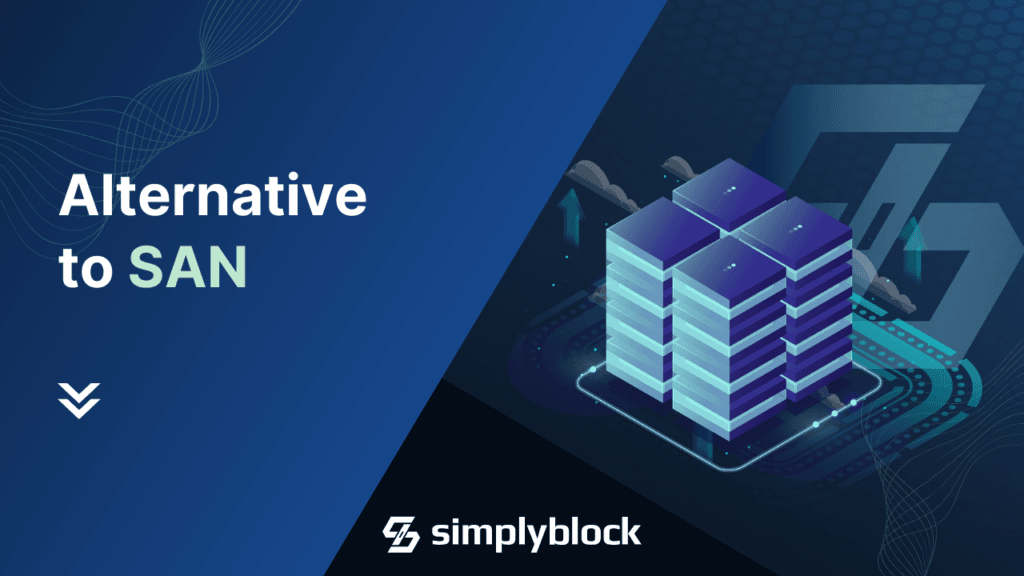Tag: Simplyblock
Simplyblock's blog brings you the latest of storage, cloud, and thought leadership

 Rob Pankow
Rob Pankow
Feb 26th, 2025 | 5 min read
Top 5 Open Source Software-Defined Storage (SDS) Tools for Enterprises
📅 Updated for 2025 | Read Time: 6 min Enterprises today generate and manage petabytes of data, with storage demands growing exponentially. Traditional hardware-based storage solutions lack flexibil
Read blog

 Rob Pankow
Rob Pankow
Feb 20th, 2025 | 11 min read
Alternative to SAN – Why Software-Defined Storage Wins in the Long Run
NetApp has been a dominant player in the enterprise storage market for over two decades, offering feature-rich SAN and NAS solutions but it’s time for an alternative. The landscape of enterprise
Read blog

 Chris Engelbert
Chris Engelbert
Feb 19th, 2025 | 16 min read
Choosing the Right Kubernetes Storage Solution for Your Workloads
TLDR: Choosing the right Kubernetes Storage isn’t easy. As a guideline for the selection, make sure you have the best of hyper-converged (co-located) and disaggregated setups. Also, make sure that y
Read blog

 Chris Engelbert
Chris Engelbert
Jan 27th, 2025 | 14 min read
5 Storage Solutions for Kubernetes in 2025
Selecting your Kubernetes persistent storage may be tough due to the many available options. Not all are geared towards enterprise setups, though. Hence, we would like to briefly introduce 5 storage s
Read blog

 Chris Engelbert
Chris Engelbert
Dec 11th, 2024 | 13 min read
Scale Up vs Scale Out: System Scalability Strategies
TLDR: Horizontal scalability (scale out) describes a system that scales by adding more resources through parallel systems, whereas vertical scalability (scale up) increases the amount of resources on
Read blog

 Rob Pankow
Rob Pankow
Oct 03rd, 2024 | 4 min read
Local NVMe Storage on AWS – Pros and Cons
What is the Best Storage Solution on AWS? The debate over the optimal storage solution has been ongoing. Local instance storage on AWS (i.e. ephemeral NVMe disk attached to EC2 instance) brings remark
Read blog

 Rahil Parekh
Rahil Parekh
Sep 20th, 2024 | 4 min read
Origins of simplyblock and the Evolution of Storage Technologies
Introduction: In this episode of the simplyblock Cloud Commute Podcast, host Chris Engelbert interviews Michael Schmidt, co-founder of simplyblock. Michael shares insights into the evolution of storag
Read blog

 Michael Schmidt
Michael Schmidt
Sep 19th, 2024 | 10 min read
Simplyblock for AWS: Environments with many gp2 or gp3 Volumes
When operating your stateful workloads in Amazon EC2 and Amazon EKS, data is commonly stored on Amazon’s EBS volumes. AWS supports a set of different volume types which offer different performance r
Read blog

 Michael Schmidt
Michael Schmidt
Sep 10th, 2024 | 5 min read
Ransomware Attack Recovery with Simplyblock
In 2023, the number of victims of Ransomware attacks more than doubled, with 2024 off to an even stronger start. A Ransomware attack encrypts your local data. Additionally, the attackers demand a rans
Read blog

 Rob Pankow
Rob Pankow
Aug 27th, 2024 | 7 min read
Avoiding Storage Lock-in: Block Storage Migration with Simplyblock
Storage and particularly block storage is generally easy to migrate. It doesn’t create vendor lock-in, which is very different from most database systems. Therefore, it’s worth to briefly line out
Read blog

 Chris Engelbert
Chris Engelbert
Mar 06th, 2024 | 9 min read
What is Erasure Coding: A Shield Against Data Loss
Erasure Coding (erasure code) is a data protection mechanism that protects against data loss by breaking data items, such as files, into fragments, calculating additional data pieces (parity informati
Read blog
